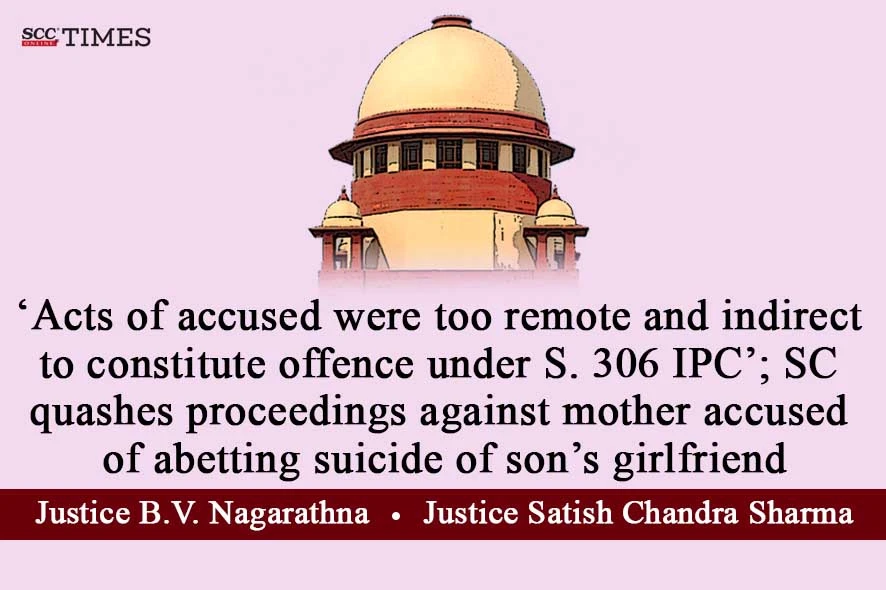Supreme Court: In a criminal appeal against Calcutta High Court’s decision, whereby the chargesheet for offence under Section 306 of the Penal Code, 1860 (‘IPC’) against the other two accused persons was quashed, while the present applicant’s (‘accused’) plea for quashing the chargesheet was rejected, the Division Bench of BV Nagarathna and Satish Chandra Sharma*, JJ. allowed the appeal and set aside the High Court’s decision to the extent of refusing to quash the chargesheet qua the present accused.
Background
The present accused person is the mother of the person who was allegedly in a relationship with the deceased. The father, elder brother, and the person himself, including the present accused, were initially accused of abetment of suicide and charged under Sections 306 read with 34 of the IPC. On 06-07-2008, an FIR was filed by the deceased’s uncle/ complainant alleging abetment of suicide against the accused. It was alleged that the deceased’s family was unhappy with their relationship and wanted her to focus on her studies. Because of this, they requested the accused persons to help them end the same, which they refused to do.
The post-mortem report disclosed that the death was caused by the effect of injuries on impact due to jumping in front of a train. The allegation against the accused herein was that she disapproved of her son marrying the deceased and insulted the deceased on account of the same.
The application for discharge under Section 227 of the Code of Criminal Procedure, 1973 (‘CrPC’) was dismissed by the Trial Court. The accused persons preferred a revisional and a quashing application before the High Court. Vide the impugned order, the High Court dismissed the application preferred by the present accused and refused to entertain the revision petition and the quashing application qua her.
Analysis and Decision
The Court elucidated that Section 306 of the IPC read with Section 107 IPC, implies that there must be (i) direct or indirect instigation; (ii) in close proximity to the commission of suicide; along with (iii) clear mens rea to abet the commission of suicide.
The Court referred to authorities pronounced by the Court, Rohini Sudarshan Gangurde v. State of Maharashtra 2024 SCC OnLine SC 1701 and Prakash v. State of Maharashtra, 2024 SCC OnLine SC 3835, wherein it was established that Sections 306 and 107 of the IPC together would indicate that there must be either an instigation or an engagement or intentional aid to ‘doing of a thing’. Applying these three to Section 306, means that the accused must have encouraged the person to commit suicide or engaged in conspiracy with others to encourage the person to commit suicide or acted (or failed to act) intentionally to aid the person in committing suicide; and that to sustain a charge under Section 306 of the IPC, it must necessarily be proved that the accused person has contributed to the suicide by the deceased by some direct or indirect act, respectively.
To throw light on the meaning of the term ‘instigation’, the Court relied on Ramesh Kumar v. State of Chhattisgarh, (2001) 9 SCC 618, wherein, this Court observed- Instigation is to goad, urge forward, provoke, incite or encourage to do “an act”. To satisfy the requirement of instigation though it is not necessary that actual words must be used to that effect or what constitutes instigation must necessarily and specifically be suggestive of the consequence. Yet a reasonable certainty to incite the consequence must be capable of being spelled out.
Considering these judgments, the Court disagreed with the High Court’s and Trial Court’s views. The Court said that even if all evidence on record, including the chargesheet and the witness statements, are taken to be correct, there was not an iota of evidence against the present accused. The Court held that the acts of the accused were too remote and indirect to constitute the offense under Section 306 IPC. The Court added that there was no allegation against the accused of a nature that the deceased was left with no alternative but to commit the unfortunate act of committing suicide.
Discerning from the record, the Court said that the accused along with her family did not attempt to put any pressure on the deceased to end the relationship between her and son the present accused. In fact, the deceased’s family was unhappy with the relationship. The Court stated that even if the accused expressed her disapproval towards the marriage, it did not rise to the level of direct or indirect instigation of abetting suicide.
Hence, allowing the appeal, the Court partly set aside the impugned order to the extent that the charges against the accused herein were upheld by the High Court. Accordingly, the pending proceedings qua the accused only were quashed.
CASE DETAILS
|
Citation: Appellants : Respondents : |
Advocates who appeared in this case For Petitioner(s): For Respondent(s): |
CORAM :










